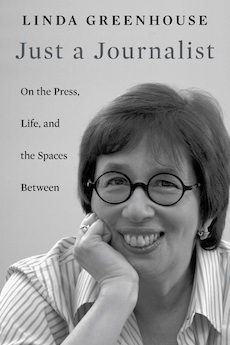By Lewis Fried
For decades, Linda Greenhouse (ΦBK, Harvard College, 1968) had been reporting on the Supreme Court for the New York Times. As a result, her understanding of the lines (broad or thin) marking the dangers to what we believe is free and informed speech, as opposed to free and deceptive expression, is authoritative and informs this small gem of a book. Based on the William E. Massey Sr. Lectures in American Studies, which she gave at Harvard in November 2015, Just a Journalist could not have arrived at a more desperate time.
Part meditation and part inquiry, Greenhouse’s elegant—and eloquent—reflections are responses to the Age of Trump, an epoch during which the current Administration and its minions have piled lies upon falsehoods. As a result, they have eroded confidence in, and the authority of, American democratic institutions and what we have understood as reliable media outlets. Whatever Trump and his surrogates feel threatening is labeled “fake news.” Sadly, many Americans believe (or are content to believe) these bold falsehoods. Greenhouse questions whether her colleagues are actively challenging such claims. Are they confident enough in their calling to do so? Or, are their received dicta and ethics about journalism inadequate to report the problems of our nation.
How so? Her major theme devolves upon the myths we (and often journalists) tell about a free as well as an unbiased press. Trump, as she well observes, has made it difficult for one to honor the vocation of journalism—in this case, writing news stories about what people need to know to understand the origin and context of issues on an empirical and sufficient basis. Objectivity is a sharp ground on which to stand; does it or dispassionate accounting involve presenting the fabled “two sides” to every story or does reporting demand informed judgment?
Greenhouse honors “the hard work of sorting out the false claims from the true and discarding or at least labeling the false.” By exploring this problem, Greenhouse makes a fine case for sagacious journalism. (What reader of Proust doesn’t remember the dismissal of newspapers because of their repetition of gossip and scandals, which after a time seem similar, as opposed to fiction, which enlarges our understanding of how we live and what we live through?)
Over the last century or so, journalists have found their methods and techniques changing rapidly. For example, stories of import that often demanded no small means and time to investigate and write can now be cobbled together from internet research (and as every college freshman is cautioned, there is more than enough evidence that the internet is not a reliable resource). The demand for “objectivity,” as Greenhouse informs us, was often a managerial tool used to rein in reporters. In addition, the fear of not being “balanced” led (and still leads) to the “he said, she said” collage of false equivalencies. Moreover, the culling of quotations to include many authorities may depend on what source a reporter feels is more quotable (or notable) than another. Finally, the refusal to “own” a story deploys the strategy of “distancing” by relying on the opinions of others. In short, we have a diminished logic of investigation that leaves readers no wiser than before, or less capable of discerning the veracity of what we need to know. Added to these, a species of Gresham’s law usually prevails: those individuals who pronounce—and do so often—on a variety of topics or noisily publicize their opinions can attract a lazy journalist looking for an available opinion.
As Greenhouse notes, a heavy editorial hand can change the force of a description into something flat, eradicating judgment. Orwellian use of language becomes common and unchallengeable if reporters do not invest their seasoned judgment in their rhetoric. In our present day, if Trump’s lies are to be countered by accurate journalism, the reporter has to recognize both a viewpoint and the need for fidelity to the problem. One’s past cannot be bleached out but can add a necessary understanding to what is being reported, what we would call a “human” understanding. Yet, shortcomings in reporting also apply to the journalist’s character. Should journalists surrender their citizenly lives to an absurd degree to report the news (for example, refusing to vote or abandoning participation in the many expressions of politics, such as joining a march)?
It would be easy to say that this small book raises large questions. Indeed, it does. But, it delivers more. Greenhouse describes how some of the caveats of journalism have had a place in her own career, and how they have shaped her view of the profession. Just a Journalist is a well-done apologia for a dedicated profession that we need and should sustain. Our nation depends on it.
Lewis Fried (ΦBK, Queen’s College, CUNY, 1964) is Professor of English Emeritus at Kent State University and a resident member of the Nu of Ohio Chapter of Phi Beta Kappa.




